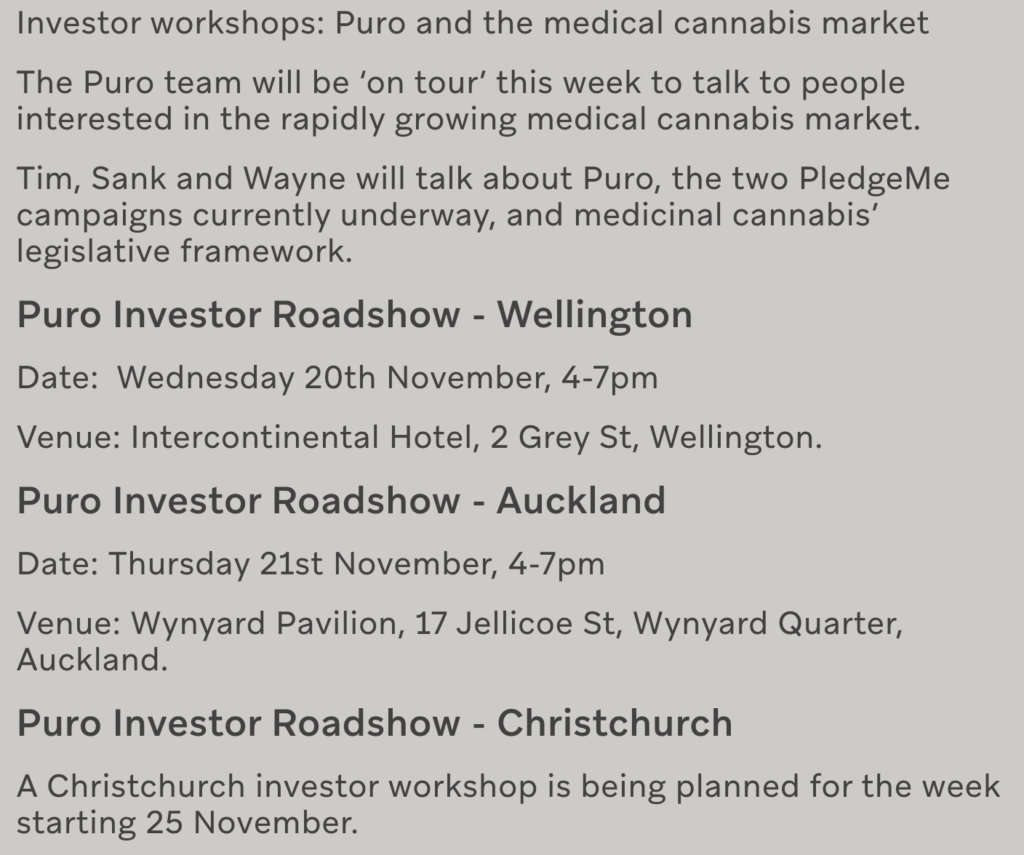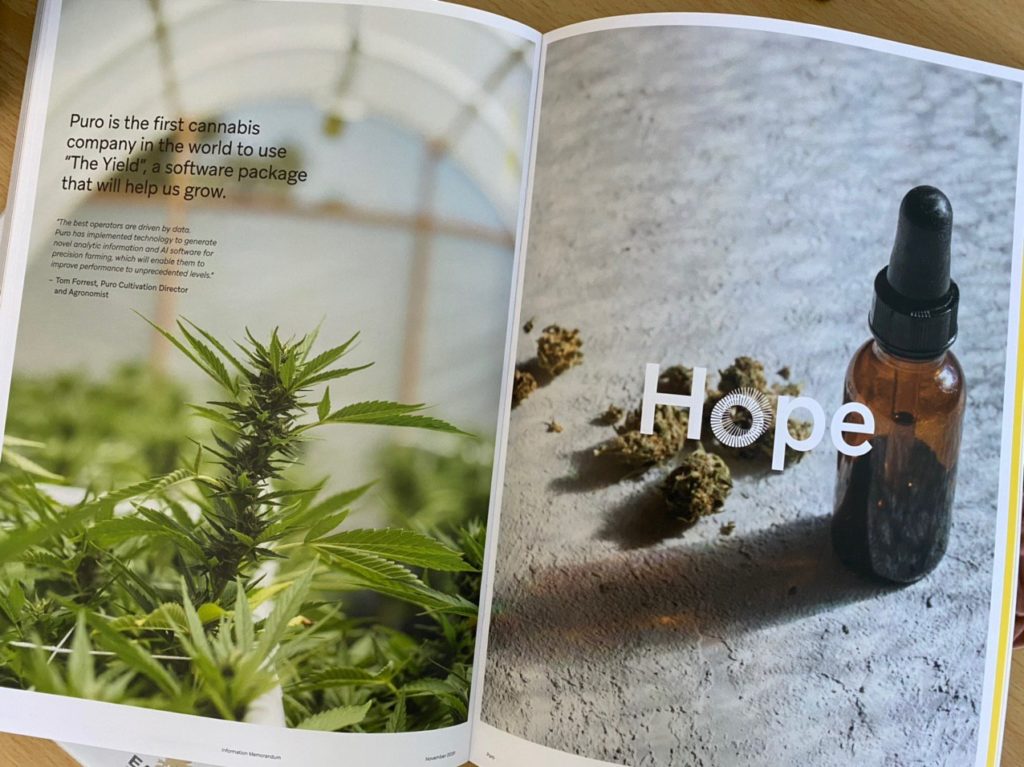
There is always some hot trend going on in the investing world, and medical cannabis is one of them right now. In recent years, we’ve seen medical cannabis firm Cannasouth list on the NZX, and a few others like Hikurangi pop up and raise capital through Equity Crowdfunding campaigns. They’re all hoping to cash in on upcoming regulatory changes which will allow New Zealand companies to grow and produce medical cannabis crops and medicines.
Puro is a new company joining the domestic medical cannabis scene, looking to raise $4 million in capital from investors. They’ve been running a series of investor roadshows, to talk about the industry and to sell their dream of becoming New Zealand’s premiere medical cannabis grower.
Today’s article takes me out of my comfort zone, as I attended one of these roadshows to learn more about this trending industry that I’m unfamiliar with, and dive into a topic that can be a bit taboo for some! In this article, I’ll cover what I leant about the NZ medical cannabis industry, and my thoughts on the roadshow – Is this bandwagon worth investing in?

This article is not endorsed or sponsored by Puro, is my personal interpretation of the event’s content, and is not to be considered as investment advice.
1. Key takeaways from the roadshow
The roadshow’s main focus was on the investment opportunity in Puro, rather than the medical cannabis industry itself. So I’ve combined what I learnt from the event with other information from my own research, in order to paint a full picture of the medical cannabis industry, and to understand the opportunities and risks of investing.
Current state of play
Internationally, the medical cannabis industry is much more mature – for example, Canada legalised medical cannabis all the way back in 2001, then followed up with legalising recreational use in 2018. Canopy, Aurora, Cronos, and Tilray, the “big 4” cannabis companies are huge, having a combined market cap of over 14 billion.
New Zealand is very much in its infancy when it comes to medical cannabis. But a few domestic companies have emerged recently, hoping to be the leaders in the NZ medical cannabis space:
- Hikurangi Cannabis (East Coast) – Initially raised $2 million through Equity Crowdfunding site PledgeMe, overwhelming and crashing the site when their crowdfunding offer went live in May 2018.
- Cannasouth (Waikato) – Listed on the NZX in June this year, raising $10 million in their IPO. Being publicly listed has certainly raised their profile, with the company having 7,000 shareholders in total, with 5,500 of them having invested through Sharesies. A video from Cannasouth’s investor roadshow is below if you’re interested in hearing more about the company.
- Greenfern (Taranaki) – Raised $1.8 million in an Equity Crowdfunding Campaign in February this year.
- Puro (Marlborough) – Just raised $2 million from retail investors through a PledgeMe Equity Crowdfunding campaign, and currently looking to raise a further $2 million from wholesale investors.
Market opportunities
What makes investing in medical cannabis attractive for NZ investors?
An emerging industry – Currently medical cannabis products are difficult to obtain in New Zealand. The majority of medical cannabis products require ministerial approval before they are prescribed to patients.
Right now the government is establishing a Medicinal Cannabis Scheme, which covers licensing, quality standards, and the establishment of a medical cannabis agency. The scheme will allow NZ companies to manufacture medical cannabis products, ultimately improving patient access to these products, and the emergence of a new industry. The scheme is likely to be operational by March 2020.
Medical benefits – Medical cannabis isn’t just a single type of plant or product. There are many chemicals found in cannabis called ‘cannabanoids’, with different varieties of cannabis, each producing different concentrations of cannabanoids. There are two main cannabnoids used in medicines, both of which Puro are hoping to grow as part of two products:
- Medical Cannabis – Contains high concentrations of THC (Tetrahydrocannabinol), the compound that gets you high, and is commonly known as marijuana. THC may help with pain, glaucoma, insomnia, and anxiety.
- High-CBD Hemp – Contains high concentrations of CBD (Cannabidiol), and is not psychoactive (won’t get you high). CBD may help with seizures, depression, inflammation, and migraines.
Market potential – Given the industry is virtually non-existent in NZ, there is the opportunity for medical cannabis companies to grow quickly, and be part of what could be a massive market – both domestically, and in exporting the product internationally. It’s not surprising that so many investors want a slice of the action. I pulled a couple of statements from the Puro Information Memorandum that suggest the potential market size for medical cannabis:
The global medical cannabis market size was estimated to reach a value of US$13.4billion in 2018. The market is further expected to reach a value of US$44.4billion by 2024.
If just 1% of those who could benefit from medical cannabis in New Zealand used it, the market could be worth $379million each year

Recreational use? – The legislation enabling medical use of cannabis is already in place, but there is a possibility that cannabis will also be legalised for recreational use, with a referendum on the issue being held in the 2020 NZ General Election. While the current focus of NZ cannabis companies is on medicine, the recreational market would further increase the prospects for these companies.
The global legal marijuana market is expected to reach USD$146.4 billion by the end of 2025. Barclays suggests that this figure could increase to USD$272 billion by 2028.
Market risks
What are the risks to investing in medical cannabis in NZ?
Licensing & Regulations – Cannabis has the potential to be abused, hence industry players require various licenses from the Ministry of Health to operate. Licensing is tough and expensive to obtain – companies must pass background checks, demonstrate that their site is secure (and away from main roads, residential areas, and schools), and have stringent processes in place for handling their product.
The current licensing regime only allows companies to grow cannabis for medical research purposes, and only ~5% of licenses have been approved so far, demonstrating that the ministry is serious about keeping out non-genuine players. Licensing will soon extend to commercial cultivation of cannabis, and obtaining and maintaining these licenses is a key risk for medical cannabis companies. However, this does raise the barriers to entry for new and competing companies.
New product risks – Pretty much all NZ medical cannabis companies are pre-revenue. When you invest in the likes of Puro and Cannasouth, you are investing into a business with no product to sell, and no revenue coming in. And there is no guarantee that the development of each company’s products will be successful, with quality, consistency, or even running out of capital being key risks.
Potential over-supply – There are so many cannabis companies emerging, that by the time all regulations are in place, and all these companies have their product established, could we see an over-supply of cannabis coming through? Will the market grow large enough to absorb the supply? News suggests there is already an oversupply of cannabis around the world, and here’s a quote from Brian Gaynor supporting that sentiment:
The issue with marijuana is that its very easy to grow and there’s a big oversupply of it world wide and everyone thought there was going to be a big boom. So you know it’s easy to produce and there are a whole pile of companies setting themselves up, but I’m not sure the demand is anywhere near the supply.
Brian Gaynor, Milford Asset Management
Prescriber Education – You won’t be able to simply walk up to a pharmacy to buy medical cannabis products. These medicines will require prescriptions from medical practitioners, so they are a critical link in getting these products into the hands of consumers. Will they get on board and prescribe medical cannabis products to their patients? Prescriber education will play an important part here.
2. Did they try to sell anything?
The main purpose of the event was to give prospective investors the chance to meet the Puro team, ask questions, and to sell the Puro dream of “producing the Sauvignon Blanc of cannabis”. It is not uncommon for Equity Crowdfunding campaigns to hold similar roadshows or webinars to engage with the investor community.
So a little more about Puro and their crowdfunding campaign: They have two sites in the Marlborough region where they plan to grow High-CBD Hemp and Medical Cannabis. What makes them different from other medical cannabis companies is that they will act as a contract grower, on-selling their plant products to pharmaceutical companies, rather than develop and produce the actual medicines themselves.
They’re raising capital through their PledgeMe campaign to fund the build of greenhouses, research facilities, to secure their sites, and buy extraction equipment. Their retail offer is now fully subscribed with $2 million invested from 723 people, the maximum amount you’re allowed to raise in a single Equity Crowdfunding campaign. However, they’re also raising another $2 million from a wholesale investor offer.
Further Reading:
– 4 things to know about investing in Equity Crowdfunding
3. Was there any free food?
Free drinks were available on arrival at the event. After a presentation about the company, scrumptious nibbles were handed out, and we were free to continue talking with each other and the Puro team. No cannabis related food or drink was on offer.

4. My thoughts on the event, and investing in the industry
I have never been to such an event before, where I could meet a company’s executive team in person, and ask questions about a potential investment opportunity. The Puro team was warm and approachable, greeting me as I arrived, and were able to answer all my questions. I wish they could have shared more information about the medical cannabis industry itself, but I can’t complain too much given that wasn’t the main purpose of the event.
As for whether Puro is a good investment or not, I was really tempted to jump on the medical cannabis bandwagon and invest in this one. There is massive growth potential when getting into a business at such an early stage, however I think there are too many risks. I’m most concerned about the potential oversupply of cannabis in the market, which could limit the growth of such a company, and feel the potential gains do not stack up against the risks. So in the end I decided against investing in Puro.
I wouldn’t invest in any of the other medical cannabis companies like Cannasouth either. Being an immature industry with almost no products or revenues, and regulatory uncertainty, it is just a speculative investment. Overseas cannabis companies have had their share prices crash hard this year after a big bubble in their prices in 2018, and we may see Cannasouth do the same, with their share price currently dropping back towards their IPO price of 50 cents. If you choose to take a punt on one of these companies, I would suggest never investing money that you can’t afford to lose.
My overall rating of the event: 3.5/5 stars
Follow Money King NZ
Join over 7,500 subscribers for more investing content:
Disclaimer
The content of this article is based on Money King NZ’s opinion and should not be considered financial advice. The information should never be used without first assessing your own personal and financial situation, and conducting your own research. You may wish to consult with an authorised financial adviser before making any investment decisions.